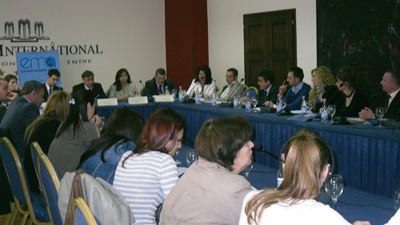Albanian Group Explores Impact of Visa Liberalization on Mobility
“Visa liberalization is the first step in Albania’s EU integration process,” said Ettore Sequi, Ambassador of the European Union to Albania, in a conference organized by the European Movement in Albania (EMA) to present the main findings of a Balkan Trust for Democracy (BTD)-supported national survey on the effect of visa liberalization on mobility and migration flows.
The survey was part of an EMA partnership with the Albanian Ministry of Foreign Affairs to explore citizens’ mobility before and after visa liberalization in the country in December 2010. A series of public service announcements explained the concept before the survey was carried out. The survey was prompted by European data showing that Albania is the country provoking the strongest fear of mass migration after visa liberalization.
 A randomly-selected group of 1,120 people were surveyed across Albania in a series of face-to-face interviews. Questions focused on travel habits before and after visa liberalization and the reasons behind travel. Nathan Koeshall, BTD Senior Program Officer, said it was important to select participants from urban and rural areas, and from varied backgrounds, as migration patterns differ greatly depending on location and social group.
A randomly-selected group of 1,120 people were surveyed across Albania in a series of face-to-face interviews. Questions focused on travel habits before and after visa liberalization and the reasons behind travel. Nathan Koeshall, BTD Senior Program Officer, said it was important to select participants from urban and rural areas, and from varied backgrounds, as migration patterns differ greatly depending on location and social group.
The survey showed that citizens from urban areas have a consistently higher tendency to migrate compared to those from rural areas, and that southern Albanians were more likely to become temporary migrants while northern Albanians showed more of a tendency towards permanent migration. Additionally, people with more education have a greater tendency to travel to new countries.
The data also revealed that there has been no significant increase in the number of asylum seekers since visa liberalization, and that citizens use visa-free travel primarily for short stays – 47% for tourism and 17% for family reasons.
The survey findings were presented at a conference in April 2011. A number of high-level officials including Mrs Filloreta Kodra, Albanian Deputy Minister of Labor, Social Affairs and Equal Opportunities; H. E. Mr Etorre Sequi, Ambassador of EU to Albania; and Mr Nikolla Ndoci, Head of Migration and Re-admissions Directorate of the Border and Migration Police attended the conference.
Data produced from the survey has been used in the ongoing revision of the Albanian roadmap to EU accession. Working groups on migration and the integration of returnees have been initiated by the Ministry of Foreign Affairs, with EMA experts invited to discuss policy options. Survey findings were also presented to key institutions in Brussels and as a result European Commission experts agreed to EMA’s recommendations to increase attention to labor market and social policies in Albania and to expand EU-funded programs in these areas.
European Movement in Albania is a think tank devoted to improving the quality of the debate on the European Integration process.